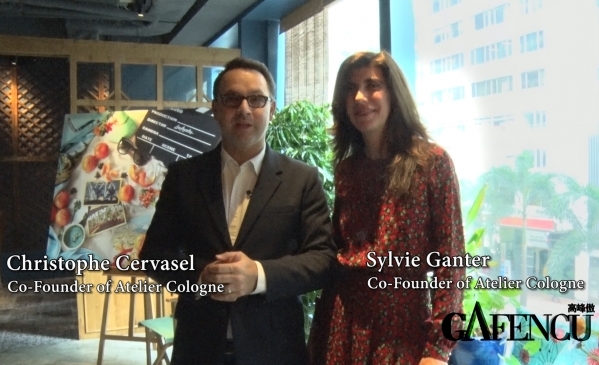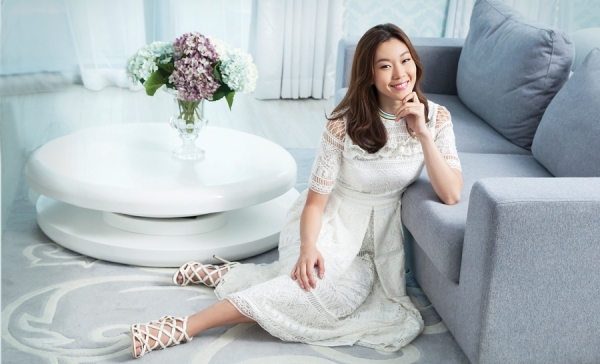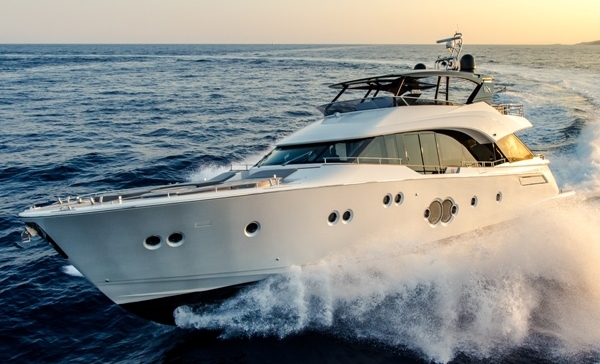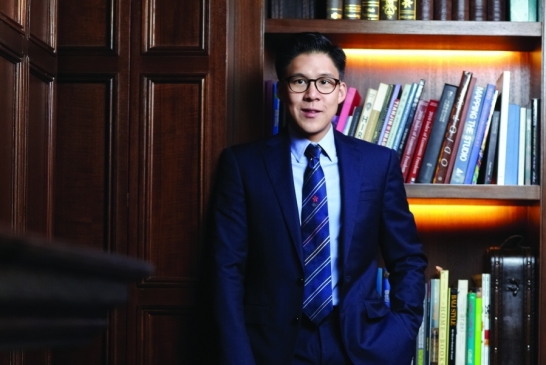
Clara Lee has landed roles in a number of films including the recently released Qing Sheng.
Click here to watch the photo shoot
Am I correct in saying that you spent a good deal of your youth travelling?
Yes, my father was working a lot in Europe, so I was born in Switzerland. My mother studied in London so that is how I received my UK citizenship. I, however, ended up studying in California and now I work in Korea.
Having seen quite a lot of the world from a young age there must be a few cities that left an impression on you. Do you have any favourites?
I love travelling because I get to meet different people, feel the different vibes in each city and immerse myself in the culture. I feel like I learn a lot by travelling so I really enjoy it. Recently when I spent time in Verona, Milan and Rome, it was very different. I had been to Milan before to shop but I didn’t really get to see much of the city, but this time around I found it very romantic. Ideally I would love to spend more time in Europe as it has now become one of my favourite places to visit.
Being so well travelled, in terms of nationality would you call yourself Korean, British or a ‘citizen of the world’?
That is difficult to say. People know me generally as Korean, so if I were asked I would say Korean. When people ask about where I grew up or want to know more about my background then I explain to them about my UK citizenship and how I spent my youth travelling a good deal.
Your father is a famous musician and your mother a talented ballet dancer. Have you inherited any of these artistic genes from your parents?
I don’t really think about it in terms of inherited talent but I do really enjoy dancing, listening to music and singing, so perhaps I did inherit some aptitude genetically. If that is the case, I certainly appreciate it! I am actually doing some work on the musical side and some ballet dancing. Hopefully I will be releasing an album in 2017.

Another one of your talents is fashion design, which you studied at university in California. Is that something you are still involved with now?
Yes that is why I recently started collaborating with the lingerie brand Charmante; it’s allowed me to get involved with fashion again. I have always been interested in fashion design so anytime I am presented with the opportunity to get involved I absolutely jump at the chance. I feel like my recent collaboration with Charmante is a great start.
You began your career as a model before making the transition onto the silver screen. Was there a particular moment you remember wanting to be an actress?
I think I always aspired to be an actress. I remember the first day I was on set working on a Korean drama, I was very nervous but as soon as the director started shooting my nerves turned to excitement. Whenever I am in front of the camera I feel very passionate and excited. Acting is something I really love to do.
What is it that you love so much about acting?
Everything! I feel like acting allows me to get in touch with myself. I feel like I didn’t know very much about myself before I started acting. Being in front of the camera makes me much more aware of how I talk, where I look and how I use my hands. I am starting to learn more about myself and learning to love myself, which is a very exciting journey.
I am generally a quiet person, not that outgoing and I only have a few friends. But when I have to play a ‘bad girl’ I am forced to be boisterous and act out by screaming or throwing tantrums, so it was interesting to see that part of myself come out, a dark side I didn’t realise I had. Other times when I play a doctor, for example, I feel happy that I can get in touch with my more intellectual self. Acting, for me, is about studying life and looking at different careers and people with very different personalities. I enjoy playing different characters and finding different sides to my own personality.

“I feel like acting allows me to get in touch with myself. I feel like I didn’t know very much about myself before I started acting…”
It sounds like you get quite wrapped up in the characters you play?
Yes, most recently I shot a movie in China where I played a swordsman and kung fu master so I learned to fence and fight. It involved a lot of scenes with wires and although naturally I am quite an athletic person, I do have a fear of heights. I didn’t know I could jump out of high buildings and all that so it has really been a learning process where I discovered quite a lot about myself. It allowed me to gain more confidence and made me even more passionate about my work. I have really enjoyed doing more action recently.
Do you find the stunt and action scenes difficult?
It can be tough but I really have found myself enjoying the more physical side of acting as well. I have learnt many different fighting techniques and I really like challenging myself. I don’t like to waste time and I love working hard.
How do you emotionally prepare for more dramatic roles?
I spend time studying the character by watching films about that specific topic. Most recently, with the action film in China, there was a lot of emphasis on the poses and the looks so I did a lot of research into different action actresses and how they portray different styles on film.
Do you dream in English or Korean?
I love this question! Actually I dream in both although sometimes I surprise myself when I start speaking English or Korean in my dreams and even I get confused sometimes!
So you are just as comfortable expressing yourself in English as Korean?
Yes I would say so, depending where I am. If I am in Korea I tend to express myself in Korean whereas when I am travelling I am just as comfortable expressing myself in English.
What is it like being a sex symbol?
It motivates me to keep fit and stay active in a healthy way. I like to think that I can be a positive role model and help motivate my fans to lead a healthy lifestyle. I enjoy sharing my diet and fitness regime with my fans. I am a very positive person so I think that also helps. It is not all about being sexy on the outside. It is just as important to feel sexy on the inside and exude a bright and positive vibe.
What would you say is the secret to success in life?
I think it is still a secret to me. I just try to work as hard as I can. I believe that whatever effort I put into my work and life it will come back to me in the form of success. I feel that if I work hard enough my dreams can come true.
In the movie Line Walker you played an assassin. Being such a naturally positive person did you find it difficult playing such a dark role?
Yes it was certainly challenging. I had to scream a lot and I didn’t really have many spoken lines so all of the emotion had to be expressed through screams or facial gestures. At the time I found it challenging but once the camera started rolling I had invested so much time in my character I almost felt like a real assassin! While I was training I found it difficult and I was often too shy to scream but once we started shooting I was fine. That is why it is so important for me to have time to train and prepare for my roles.
If you hadn’t become an actress what could you see yourself doing instead?
I think I would have liked to have been a fashion designer. I am always reading about and staying up-to-date with fashion. I find fashion changes so quickly nowadays but I have my own look. I like to wear high-waisted clothing to make my legs look longer or tighter-waisted clothes to accentuate my curves. I have the kind of fashion sense that I feel looks good on me. I like to wear fitted clothing. If I wear baggy clothing I tend to eat more so I try to wear tight clothing to help motivate myself to keep fit.
You have also appeared in a few music videos. Is there a certain musical genre you are more partial to?
I like ballads and sad songs. I am typically quite a cheerful person and I used to listen to a lot of EDM and fast songs, so I would like to branch out a bit and work on ballads to challenge myself musically.
Do you have any favourite musicians?
I love Beyoncé but I can’t imagine her wanting to work with me! I love her, she is my musical motivation.
What do you do in your time off and what is an ideal day for you?
When I am in Hong Kong I like to take in the views, so I like to go to bars and restaurants on the top of high-rise buildings. The weather is perfect right now because it is not too hot and it is pleasant, so I like to stay outdoors, walk around the city and do a bit of shopping. I love places like Isola which has a great view and good food.
Thank you.
Text: Hans Schlaikier












 “We trust our children to decide for themselves what is best in life. All we really want is for them to enjoy themselves.”
“We trust our children to decide for themselves what is best in life. All we really want is for them to enjoy themselves.”









 Andy Wong is a director of both Mandarin Fur and the Hong Kong Fur Federation.
Andy Wong is a director of both Mandarin Fur and the Hong Kong Fur Federation.
 “My favourite designer would have to be Hedi Slimane, Yves Saint Laurent’s former creative director”
“My favourite designer would have to be Hedi Slimane, Yves Saint Laurent’s former creative director”





 “I think I am probably better equipped than a man when it comes to multi-tasking”
“I think I am probably better equipped than a man when it comes to multi-tasking” 






